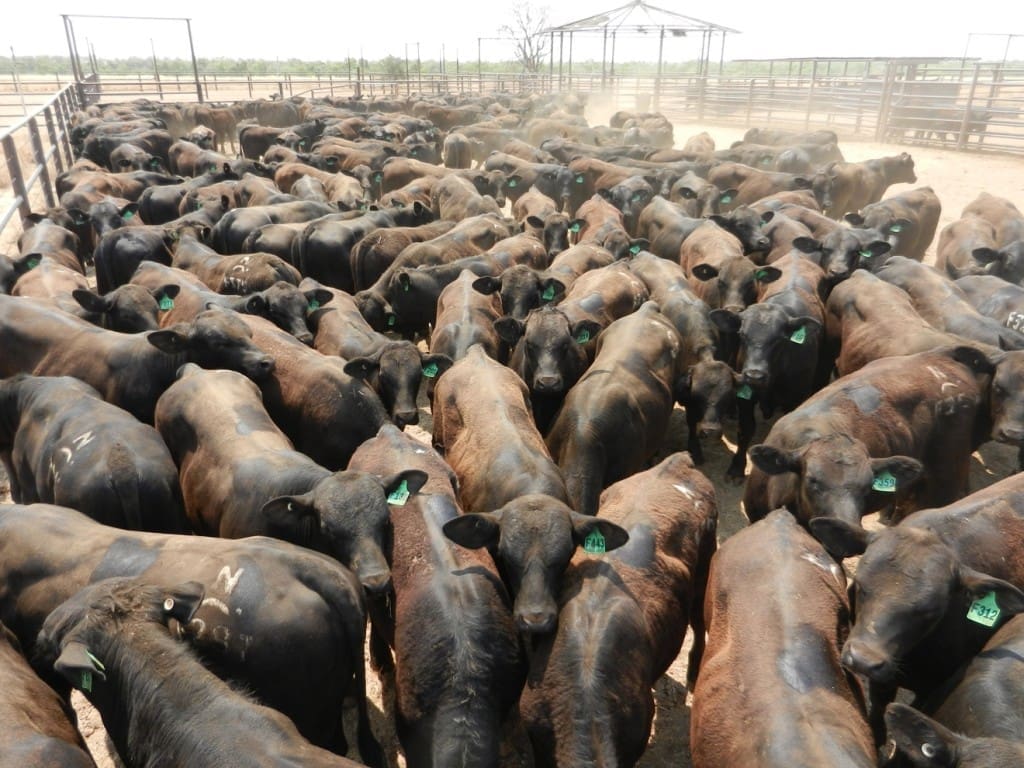
Contract-bred young Ultrablack bulls on the Barkly Tableland
A DECADE ago, contract bull breeding was all the rage. Big commercial operations would contract seedstock producers to produce lines of bulls of prescribed breed content carrying genetics of specific merit.
Mostly they were closely-guarded private arrangements between seedstock producers and buyers to keep competing seedstock producers away from 50 to 100 bulls-a-year clients.
Is contract bull breeding still active, or are the big bull buyers doing their own thing in their own elite herds? Evidence suggests contract bull breeding is not as big as it used to be.
Typically under contract bull breeding arrangements, a commercial producer looking for big lines of bulls carrying specific genetics, sometimes through prescribed composites, orders bulls a couple of years prior to them being needed.
Sources close to the contract breeding business suggest contracts varied, but the most common criteria included breed content, weighting of prescribed EBVs, age and weight at delivery. Many included reject clauses allowing the buyer to select from a group that contained more bulls than the buyer actually required.
Pricing arrangements also varied, with some aligned to industry benchmarks such as the Eastern Young Cattle Indicator, while others worked simply on on pre-agreed prices.
Many breeding contracts specify the age of delivery which can be anywhere from nine to 18 months. Most are bred utilising embryo transfer, resulting in multiplying the best male and female genetics available.
Contract breeding needs to be a win-win situation
The Nindooinbah Angus, Brangus and Ultrablack operation near Beaudesert in southern Queensland has been in the contract breeding business for some time.
Nindooinbah’s Nick Cameron said demand for lines of bulls to be produced under contract depended heavily on the confidence of buyers, seasonal conditions and the cattle market.
“Contract breeding must be a win-win situation for all parties, and buyers must have a long-term genetic strategy,” he said.
“Contract bull breeding is certainly the best way to instill top quality genetics en masse into larger operations. If the buyers know precisely what they want and the breeding is properly managed, it can be very advantageous.”
The main demand for contract breeding at Nindooinbah over recent years has been for Ultrablacks and a couple of Brangus deals, with some on-going at the moment.
“Big operations can find it difficult to obtain bulls with specific genetics they require by attending on-property bull sales. They often have to load-up from paddock sales where quantity and quality can be issues,” Mr Cameron said.
He believes that an operation wanting only 20 bulls a year could benefit from contracting to buy bulls a couple of years out from when they are needed.
“It’s just like fertilising a paddock. Regular infusions of top quality bulls will increase profitability.”
Not necessarily for the bigger buyers
Beef Central caught up with one of Australia’s biggest seedstock producers, David Bondfield, while in the car on his way home from judging at Melbourne Royal. The Bondfields’ Palgrove operation on the Qld/NSW border provides the industry with up to 1000 Charolais, Ultrablack and Charbray bulls a year through on-property auctions, paddock sales and contract breeding.
“The positive thing about contract breeding is that we can produce a specific genetic combination that provides the buyer with the bulls they need, at a set price”
A front had just dropped a much-needed 75 mms of rain on Palgrove’s Emerald property in central Queensland, but it didn’t reach their Darling Downs and the New England properties. However it was a ‘great start,’ according to David.
“Our business certainly provides for contract buyers, and these are not necessarily the bigger buyers. They include smaller family-scale operations right through to the bigger end of the market, with buyers seeking bulls for specific purposes and environments,” he said.
“The positive thing about the contract breeding is that we can produce a specific genetic combination that provides the buyer with the bulls they need, at a set price, so that budgets can be managed,” he said.
CPC breeds its own
The giant beef industry player Consolidated Pastoral Co cherry-picks top genetics to use in the company’s registered Angus, Brangus, Brahman and Charolais herds to breed their own composite bulls for use in CPC’s 400,000 head herd run on 5.5 million hectares on 16 properties in Queensland, Northern Territory and Western Australia.
Chief executive Troy Setter said while he was aware that other big pastoral players used contract bull breeding to source genetics, CPC did not traditionally do that.
“We buy in external sires with good phenotype and EBVs to produce our own straightbred and composite bulls for our own use,” he said.
“Genetics are really important to keep elevating the quality of the CPC herds, and breed content is managed to match the range of environments where the cattle are run. At times ET programs are used to multiply desired genetics,” he said.
